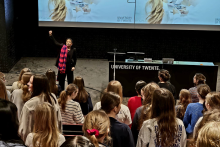What is the main goal of the ‘Manage your career’ course?
‘The University of Twente aims to realize a better gender balance at the (sub)top. The ‘Manage your career’ course is for women from all over the UT – scientists, support staff, managers – that want to explore, broaden and deepen their leadership skills, for example to reach a more senior position in science, staff or management. Women encounter different dilemmas than men during their careers. There are still pitfalls for women at the UT.’
What are these dilemmas?
‘It’s still harder for women to reach the top in general. There are many causes, of course. It’s partly due to organization culture. Within most organizations so called female qualities like empathy or valuing teamwork are less appreciated or less seen than so called masculine qualities like competition or being direct. This is also something we address in the course. Another dilemma is the “prove it again” mechanism: men are more often evaluated on their track record, whereas women have to prove themselves time and again.’
‘Also, for women there is often a gap between “likeability” and their competencies, meaning it’s hard for them to be respected as a competent professional and at the same time be liked as a person in the workplace. For men this tends to be easier. I have also seen that women tend to internalize biases into self-defeating thoughts, like: “I am not suitable to become a professor because I am not the professor kind of person.” In reality they have the same qualities and do the same work as their male peers. In addition, there are less female role models which doesn’t have a positive effect: you can’t be what you can’t see.’
What do the participants tend to struggle with the most in their career? Do you see any issues specific for the UT?
‘Participants usually struggle with building networks and showing their competencies in such a way that other people recognize them as valuable for the organization. Another topic is when to adapt to the demands of the organization to act in a masculine way or to remain authentic. In this program participants learn to deal with this dilemma and explore personal answers and strategies and to develop the necessary skills. They learn to be flexible in applying leadership styles.
‘For example: a woman who is applying for a position introduces herself to the selection committee smiling in a friendly way to each of them, she has a soft voice. During the interview she is honest about what she is good at and what she is not good at. For the woman this is about connecting and honesty: if you want to hire me you have to know who I am. For the committee this could be perceived as insecurity and not being tough enough for the job. These examples are not only seen at UT but in other organizations as well.’
This course is only for women. How would it be different if it was for men or for a mixed group?
‘It would certainly be different. Not better, not worse, but certainly different. A women only group provides a safe environment to discuss issues that specifically women encounter. And, they can be more vulnerable in a women only group.’
How does the course help them to manage their careers?
‘First of all we work on awareness regarding the above. We empower women to believe in themselves and to pursue their own visions and ambitions. We challenge them to strengthen their authentic styles and develop the skills they need to realize their ambitions. They are stimulated to outline their ambition clearly and develop a personal strategy to influence their environment or to build their career. For example, it is important to have a clear ambition but at the same time you need to mobilize your environment to support you in obtaining that goal.’







